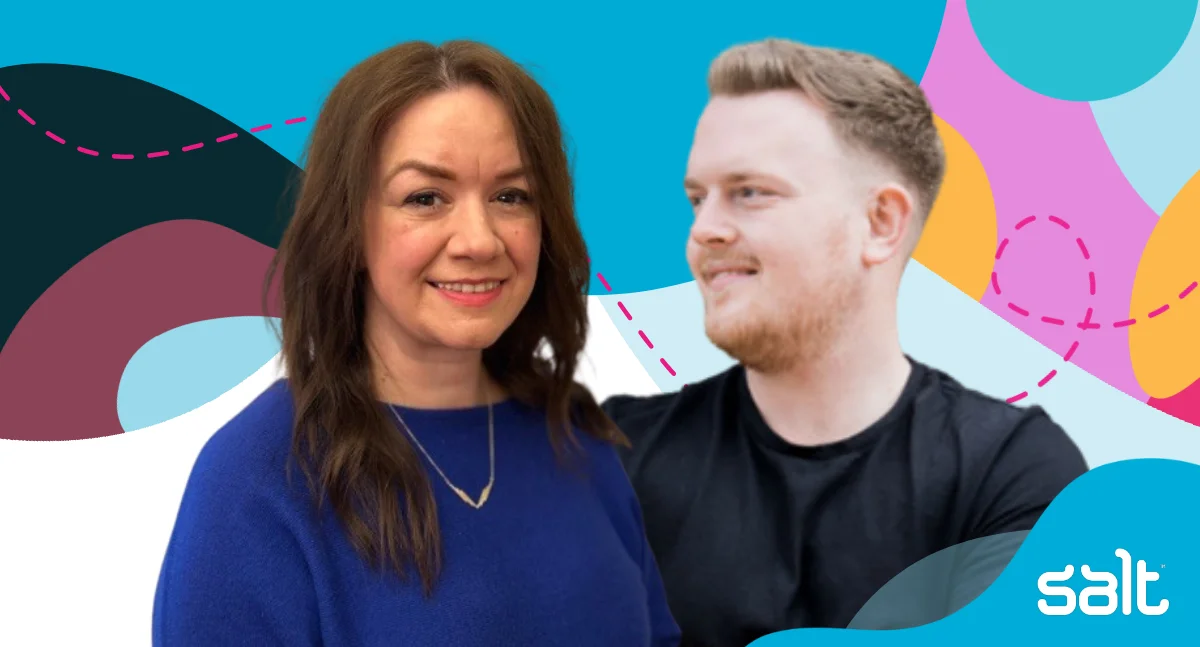
Nicola Mather, CRM Director at Experian, shares her journey from leading global CRM projects at PayPal and Skype to building a data-driven CRM function from scratch. She explores customer relationship marketing’s growing role across product and marketing and the value of lifecycle insight shaping strategy. Nicola shares how brands can create meaningful, trust-led relationships with every customer – loyal, disengaged or dormant.
In this Expert Insights series, Practice Manager Murrie Christie sits down with senior leaders in the CRM space to unpack #AllThingsCRM, from the latest industry trends and hiring insights to career advice and the future of customer relationship management. Expect bold conversations, practical advice, and a look behind the scenes of what’s shaping CRM today.
Looking for CRM experts for your next project? Salt can help.
Connect with Murrie on LinkedIn for more insight
Career & background: connecting the dots for global brands.
Tell us about your journey into CRM and how you got into the industry.
I began my journey leading a passionate marketing team in the music industry, where I honed my skills in product development and niche audience engagement.
I transitioned into the financial sector with MoneyGram, taking on a global marketing remit. There, I deepened my understanding of customer behaviour across diverse markets – learning how cultural nuances shape content, channel strategy, and investment decisions.
My next chapter took me to PayPal, then part of eBay, where I focused on lifecycle marketing, customer relationship marketing, and digital channels to drive customer retention and loyalty. I moved to PayPal’s San Jose headquarters and immersed myself in a fast-paced, tech-forward environment and led an onboarding lifecycle project, working at the intersection of data, experience and innovation.
Joining Skype marked a turning point, managing a customer base of over 600 million and, for the first time, giving direction to tech engineers. It was a steep but rewarding learning curve, where I helped design an in-house customer bot and deepened my product marketing expertise.
Most recently at Experian, I built a CRM function from the ground up in a pivotal team within a fast-growing, competitive business. I’ve built and scaled the team from scratch, implementing automation tools and leveraging data intelligence to deliver personalised, insight-driven customer engagement across channels.
Throughout my career, I’ve been passionate about connecting the dots between customer needs, technology, and creative strategy, always looking for new ways to build meaningful, lasting relationships between brands and people.
CRM strategy: delivering customer value to drive business growth.
How do you define an effective CRM strategy in today’s customer-centric world? Where everyone is trying to engage better with their customers.
CRM strategy is where I thrive. Lifecycle mapping, segmentation to automations and retention flows – this is the stuff I live and breathe. Working with founders, CMOs, and growth teams to build CRM ecosystems that don’t just “send emails” but drive real results.
Startups move fast – and so do we. I’m often brought in to overhaul CRM setups, build from scratch, or scale what’s already working. That means knowing exactly where to start, what levers to pull, and how to make CRM a revenue-generating machine, not just a “nice to have”.
An effective CRM strategy is one that really understands the path of the customer, how they were acquired, what actions they have taken and how they are engaging with the brand. Data is integral to the effectiveness of a CRM strategy.
What are some key metrics you track to measure CRM success?
A good CRM strategy delivers value to the customer and drives commercial outcomes. It’s not just about engagement – it’s about impact. CRM’s true superpower lies in its ability to reach and understand the entire customer base. Reach alone isn’t enough; communications should aim to be meaningful, trust-building and relevant.
It’s not only about managing customer data and great tech, but also about meaningful connections.
In a world where every brand is trying to engage customers better, I think the customer lifecycle has always been a critical framework for CRM. It isn’t one size fits all, onboarding, retention, or reactivation – each stage requires its own strategy, messaging, goals and KPIs.
Success comes from tailoring the experience to where the customer is in their journey.
Industry trends: CRM’s shift from a communication tool to an end-to-end customer engagement engine.
How have you seen CRM evolve over the past 5–10 years?
When I began my career, CRM was often a quiet function within the marketing team, relatively low-cost and low-profile compared to other departments. But that’s changed dramatically.
Today, CRM doesn’t stop when a customer clicks on an email. That click is just one moment in a much larger, ongoing relationship.
Now, we ask questions like, ‘How many customers will need support logging in?’ and ‘What’s the best landing point?’, ‘How critical is the message for the customer?’ and ‘What are their preferences?’
And for each of these questions, there is a follow-up; for example, what happens after the message? Did they stay on the page, interact further, or add something to their basket?
CRM has grown to encompass the entire end-to-end customer journey, meaning we work just as closely with product as with marketing. It plays a role in every interaction – from login flows to product recommendations to marketing promotions. Every customer action informs how we communicate next.
CRM has become a strategic engine – not just for marketing, but for product – delivering seamless, personalised experiences across the entire customer lifecycle.
How do you see CRM fitting into broader business strategies?
CRM plays a core role in advancing strategic business agendas. When implemented effectively, it can build trust and increase customer loyalty through consistent and personalised communication. Timely and relevant messages boost customer engagement by keeping customers informed and active. CRM can identify opportunities with new audiences, cross-sell and nurture long-term relationships with existing customers to increase customer lifetime value. And most significantly, CRM can drive innovation by capturing rich transactional and behavioural data, which informs customer insights used to inform product and marketing strategies.
CRM teams possess a unique superpower; they can connect with every customer, not just the highly engaged but also the quiet, the disengaged and the dormant segments. Personalised, timely, value-driven messages can help customers unlock the full potential of the product. At Experian, we use smart CRM in several ways to engage different customer segments. We can highlight missed opportunities by using personalised product updates to show how you (the customer) could save money, for example, by switching to a lower-rate credit card because your balance transfer promotional period has ended. We reveal overlooked insights with simple action-driven messages, such as, ‘You haven’t viewed your credit report for 90 days, and two things have been added which you might want to review.’ We send relevant messages in response to market changes, for example, ‘The Bank of England reduced the base rate, which may mean you could save money with a better rate.’
CRM can help different customers realise the full value of the product for their needs. By leveraging data, behavioural signals, and lifecycle insights, CRM becomes more than just a communication channel.
Leadership & future outlook: curiosity, creativity and customer focus.
What do you look for when interviewing or reviewing CVs?
When I interview, I’m not only looking for experience, but I’m also looking for ownership, authenticity and curiosity. I want to know what you have driven and what you have made happen; this reveals passion.
I also want to know if they are paying attention to what’s happening in the industry, so I ask who they think does CRM well and not well: the good, the bad and the ugly.
I usually ask people what their secret sauce is – everyone has something that sets them apart. It provides me with a glimpse into their core values and strengths. This could be analytical thinking, empathy, creativity, or resilience; it’s a very revealing part of the conversation.
Hiring? Salt connects you to outstanding top talent worldwide
If you’re interested in hearing about how Salt’s top talent recruitment experts around the world can help with your hiring right now, get in touch. Click below to contact the closest Salt team to you!
- Australia
- Canada
- Belgium
- Europe
- Hong Kong
- Malaysia
- Middle East and North Africa
- Netherlands
- New Zealand
- Singapore
- South Africa
- United Kingdom
- United States
Keep up with Salt’s top talent job market insights and hiring advice! You can keep in the loop by following us on. LinkedIn, YouTube, Facebook, Instagram, and Spotify.


